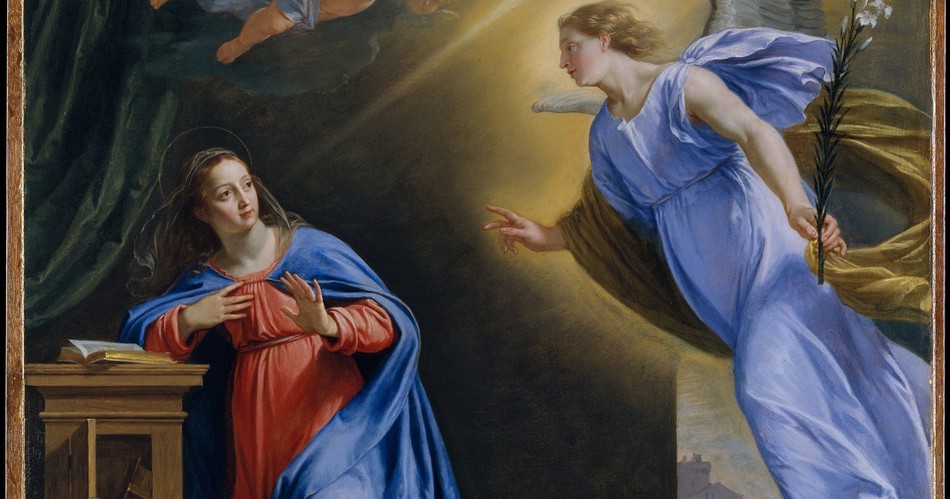Starting with Abraham, the Bible records God’s call to individuals and whole communities, people to live with and for him to bring peace and life to the world in one way or another. God chooses and calls, but people must respond to the invitation themselves. The Lord doesn’t force or coerce love or service. It’s not his way.
We have one of the greatest calls in history within the Christmas narrative. A young girl, likely a teenager, finds out she’s been chosen to bear the Savior of all creation. We call this the Annunciation, and as we explore the holiday connected to this event, we find principles for us all to also respond to the heavenly call.
How Did the Feast of the Annunciation Develop?
The Feast of Annunciation celebrates the moment when the Angel Gabriel announced to the Virgin Mary she would conceive by the Holy Spirit and bear the Son of God, the Messiah. Luke 1:26-38 records this event. The feast has become one of the major events in Christian liturgy and also remembers Mary’s “yes” to God’s plan and her role to bring Immanuel to the earth.
The Feast of Annunciation originates in the early church, from at least the fourth century. Tradition suggests it was celebrated in Jerusalem, where Christians had the feast in the Church of the Holy Sepulchre. By the next century, the feast was observed in both the Eastern and Western churches, although not with the same importance.
The feast spread through the church over the centuries. In Eastern Orthodox tradition, it became one of the Twelve Great Feasts, central to the devotion to Mary. The Roman Catholics included the feast more universally during the Middle Ages. Pope Urban IV highlighted it in the 13th century. Over time, the Feast of Annunciation developed to include various customs and traditions.
The Feast of Annunciation happens on March 25, exactly nine months before the traditional date for Christmas, December 25. Theologically, Christians connect the Annunciation with the mystery of the Incarnation, where God took on flesh in Mary’s womb. Believers further honor Mary’s obedience and faithfulness to God’s call.
Where in the Bible Do We Find the Annunciation?
Luke 1:26-38 recounts the Annunciation. In verses 26-30, we read about when God sends Gabriel to Mary: “In the sixth month, the angel Gabriel was sent from God to a city of Galilee named Nazareth, to a virgin betrothed to a man whose name was Joseph, of the house of David. And the virgin's name was Mary. And he came to her and said, ‘Greetings, O favored one, the Lord is with you!’ But she was greatly troubled at the saying, and tried to discern what sort of greeting this might be. And the angel said to her, ‘Do not be afraid, Mary, for you have found favor with God.’”
Being visited by a powerful angel disturbed Mary, as it does many people in the Bible. In the next verses (31-33), Gabriel clarifies why he’s there. “And behold, you will conceive in your womb and bear a son, and you shall call his name Jesus. He will be great and will be called the Son of the Most High. And the Lord God will give to him the throne of his father David, and he will reign over the house of Jacob forever, and of his kingdom there will be no end.”
Gabriel includes language pointing to Old Testament prophecy about the Messiah: being a king in the line of David and how his kingdom would be everlasting. Importantly, the angel includes how Jesus would be the Son of God, a divine being in the flesh.
Mary doesn’t understand since she was engaged but not married yet (verses 34-37). “And Mary said to the angel, ‘How will this be, since I am a virgin?’ And the angel answered her, ‘The Holy Spirit will come upon you, and the power of the Most High will overshadow you; therefore the child to be born will be called holy—the Son of God. And behold, your relative Elizabeth in her old age has also conceived a son, and this is the sixth month with her who was called barren. For nothing will be impossible with God.’”
The angel explained she would conceive from the Holy Spirit, making the baby both God and human. Then Gabriel does a compassionate thing: he sends Mary to her cousin Elizabeth, who also experienced a miraculous pregnancy. In light of announcing she would conceive while a virgin, Gabriel reminds her that nothing is impossible with God.
Mary famously submits to God’s plan (verse 38). “And Mary said, ‘Behold, I am the servant of the Lord; let it be to me according to your word.’ And the angel departed from her.” Mary’s response teaches every believer to respond to God with humility and faith.
How Do Christians Observe the Feast of Annunciation?
For Roman Catholics, the Feast of Annunciation is a high feast day, and is extremely important. If March 25 falls during Holy Week, the feast is moved to another day. Catholics observe the Annunciation with a special Mass, including prayers and hymns about Mary and her role. Since Mary is a central and elevated figure in Catholicism, they practice great devotion to her on this holiday, notably with the Angelus, a prayer based on the Annunciation. Some also practice acts of charity to reflect on Mary’s humble obedience and the purpose of the Annunciation, bringing a kingdom of peace.
The Feast of Annunciation is also one of the Twelve Great Feasts in Eastern Orthodox traditions. They celebrate it with a liturgy that has special hymns, prayers, and a reading of the Annunciation from Luke. Orthodox Christians highlight the Incarnation and the new creation of believers in their doctrine, so they use the feast to highlight the mysterious dual nature of Jesus and the fulfillment of God’s plan. Orthodox churches also look at Mary’s positive and submissive response to God and the angel. Many Orthodox communities celebrate the feast with joy, meals, and family gatherings.
For Anglican and liturgical Protestant churches, the Feast of the Annunciation holds various importance in their traditions. Anglicans lean toward observing it with customs and liturgies similar to the Catholic church, although not with the heavy emphasis on Mary. While less significant on their calendar than the Catholic or Orthodox, Anglicans still use the feast to teach the importance and awe of the Incarnation. Other Protestant and Evangelical denominations don’t observe the feast but might have it on their church calendar, mentioning it during Advent or leading up to Christmas.
What Are Some Prayers for the Feast of Annunciation?
One of the most well-known prayers is the Angelus, a traditional Catholic prayer recited especially during the Feast of Annunciation. The Angelus reads:
“The Angel of the Lord declared unto Mary,
And she conceived of the Holy Spirit.
Hail Mary, full of grace, the Lord is with thee.
Blessed art thou among women,
And blessed is the fruit of thy womb, Jesus.
Holy Mary, Mother of God,
Pray for us sinners, now and at the hour of our death. Amen.”
Another important prayer during this time is the Magnificat, also known as the Song of Mary. When Mary visits Elizabeth, after Gabriel’s direction, the babe in Elizabeth’s womb reacts, being filled with the Holy Spirit, and Elizabeth is filled with joy. This spiritual response confirms God’s call to Mary, and she utters a praise to God for his faithfulness. The Magnificat prayer reads:
“My soul magnifies the Lord,
And my spirit rejoices in God my Savior,
For He has looked on the humble estate of His servant.
For behold, from now on all generations will call me blessed;
For He who is mighty has done great things for me,
And holy is His name.”
In the Eastern Orthodox Church, the Akathist Hymn to the Theotokos (Greek for Mother of God) is an elaborate prayer to honor Mary’s role and obedience, which leads to the Incarnation and salvation for the world. The hymn has 24 stanzas, each emphasizing different aspects of the Annunciation. Here are a couple important stanzas:
The First Ikos:
“Seeing this strange and wondrous birth, let us, the faithful, marvel and cry aloud: ‘The Lord of all, who is without beginning, is born of a Virgin in a manner past understanding and recounting; the God who has no body takes form, and is seen in the flesh, and is revealed to us as man. Let us glorify Him, and cry out, Rejoice, O Mother of God, who gave birth to the Savior of our souls!’”
The Fourth Kontakion (Stanza 4):
“The Word, who is from the Father, took flesh from thee, O Theotokos, and, without changing, became man. He who is by nature God became by His voluntary choice man, that He might restore the image which was fallen in the beginning. O wondrous exchange! The Creator of the world becomes a babe in the womb of the Virgin!”
How Do We Live Out the Annunciation Today?
Just as Mary carried Christ within her, we also carry Jesus through the Holy Spirit, bringing his presence to the world around us.
First, we should recognize that we, like Mary, have been chosen by God to bear his presence in our lives. Through the Holy Spirit, Christ dwells within us, giving us his continued comfort and empowering us to obey the Father and live out his message to the world. Wherever we go, we’re called to bring the truth of his hope, redemption, and salvation. This includes our actions and words, our whole lives reflecting Christ to others.
Like Gabriel, we are also messengers of the Gospel. The Annunciation reminds us that God calls us to speak the good news of the Lord Jesus Christ to others. God sent Gabriel in the Nativity, and God has sent us, too. As such, we have the joy and responsibility to share the message of the Messiah’s death, life, and resurrection. And how he will return one day in the future to set the world right again. By talking of Christ and his work in our lives, we join with God in his mission to reconcile all creation to himself through the Son by the Spirit.
Finally, we can live out the Annunciation by speaking blessings over others. The apostle Paul commands us to bless others and not curse, even if they persecute us (Romans 12:14). The root of blessing comes from God’s original covenant with Abraham, how through his one descendant, Christ, all nations will be blessed (Galatians 3:16). Gabriel’s word was more than an announcement; it was a blessing. We can pray for others, speak words of encouragement, meet material needs, and share God’s compassion in various ways. We’re called to be a light in the world, bringing the Father’s love to our contexts in real ways.
Living out the Annunciation means willingly embracing God’s call to carry Jesus within us and share his message of hope, salvation, peace, and love to a broken, dying world.
Peace.
Read More about the Feast of the Annunciation:
How Did Mary Respond to the Angel Gabriel's Message?
Photo: Public Domain: The Annunciation – painting by Philippe de Champaigne






